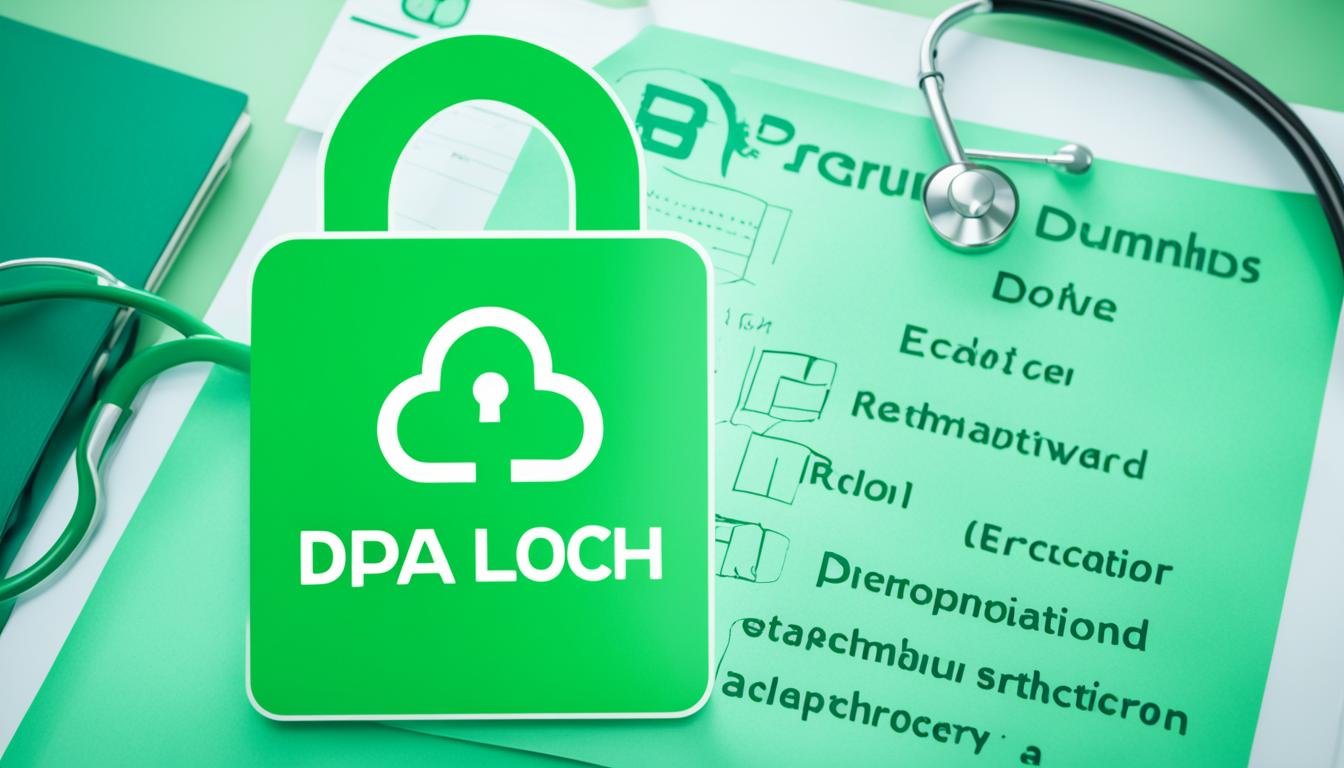Data Protection Act 2018: What Irish Healthcare Providers Need to Know
Healthcare workers should be careful with patient data. The Data Protection Act 2018 and GDPR make it important. They have strict rules to follow about keeping data safe and confidential.
Workers in healthcare handle a lot of personal information. This makes following data protection laws very important. The Data Protection Commission (DPC) in Ireland watches to make sure they do.
The DPA 2018 brings the GDPR rules to Ireland. It also deals with how law enforcement uses personal data. This helps keep personal data safe in different sectors, including healthcare.
Key Takeaways
- The Data Protection Act 2018 aligns with GDPR, emphasizing healthcare data protection in Ireland.
- Healthcare staff must ensure the security and confidentiality of patient data, both electronically and on paper.
- The Data Protection Commission (DPC) oversees compliance and enforces penalties for breaches.
- Regular training on data protection principles is critical for all healthcare providers.
- Healthcare providers must implement a clear desk policy and ensure data is only accessed on a need-to-know basis.
- Disciplinary actions can result from breaches of data protection regulations by healthcare staff.
- Encryption and strong password policies are essential to protect patient data.
Introduction to Data Protection Act 2018
The Data Protection Act 2018 is a big step in data privacy laws. It builds a strong base for GDPR compliance in Ireland. This law keeps the most important parts from older laws. These support national defense and how Ireland works with other countries. The act guides how we protect personal data. It makes sure everyone’s rights are safe, including those who have passed away. In healthcare, Irish healthcare providers must follow these rules. This makes data handling fair, clear, and accountable.
Background and Context
The GDPR sets data rules for the EU, Ireland included. In Ireland, the Data Protection Act 2018 uses the GDPR’s framework. It updates data laws with a focus on health and social care privacy. This act brings GDPR and EU laws into Irish law. It changes how we handle sensitive health data, like medical records.
Core Objectives of the Act
- Lawfulness, Fairness, and Transparency: Using personal data must be clear, lawful, and fair.
- Purpose Limitation: Data is only gathered for clear, legal reasons and not used for other reasons.
- Data Minimization: Just the data needed for the purpose is collected and used.
- Accuracy: Data must be correct and kept updated.
- Storage Limitation: Data is only kept as long as it’s needed.
- Integrity and Confidentiality: Data handling must be secure to stop wrong access or loss.
- Accountability: Companies must prove they follow these rules.
The Data Protection Act 2018 also decides that digital consent starts at age 16. It’s the same as the GDPR. The act is checked by the Data Protection Commission (DPC). They make sure Irish healthcare providers are doing the right things.
The Role of GDPR in Healthcare Data Protection
The GDPR changes how we think about protecting healthcare data. It focuses on keeping patient information safe. This involves strict privacy rules and strong security for patient data. Starting on May 25, 2018, it replaced the old data protection laws from 1988 and 2003. It offers a more thorough way of handling patient data.
GDPR Compliance Essentials
Healthcare providers, no matter their size, must follow the GDPR. They must stick to key principles like using data for the right reasons, only collecting what they need, and keeping it safe. They also have to keep detailed records of how they handle personal data. This fosters a sense of responsibility.
- Stricter rules on consent: Healthcare entities must ensure that patients give explicit consent, with an easy opt-out mechanism.
- Transparency requirements: Patients must be informed about how their data is used, stored, and protected.
- Data breach notifications: In case of a data breach, the Data Protection Commissioner must be notified within 72 hours to mitigate risks to individuals’ rights and freedoms.
Special Categories of Personal Data
The GDPR treats certain kinds of data, like genetic details, with extra care. Handling this data often needs a person’s clear agreement. It’s challenging to find exceptions to this rule. Healthcare settings must focus more on keeping this special data safe.
| Category | Protection Requirement |
|---|---|
| Health Data | Explicit Consent |
| Genetic Data | Explicit Consent |
| Biometric Data | Explicit Consent |
Impact of GDPR on Healthcare Providers
GDPR has changed how healthcare protects patient data. Now, they must not only have strong security but also appoint Data Protection Officers (DPOs). These officers are key in looking after the rules, especially for risky data processes.
“The GDPR introduces a new principle of accountability, ensuring that organizations like hospitals and clinics keep detailed records of data-related activities. The appointment of DPOs underscores the need for continuous monitoring and compliance within the healthcare sector.”
With a focus on assessing data protection and tough penalties for breaking rules, GDPR makes strong data privacy essential. As the system gets better, so does the effort to keep patient data secure in healthcare.
Key Requirements for Irish Healthcare Providers
Being up-to-speed on key needs is vital for healthcare pros in Ireland. They must maintain effective healthcare data practices and follow GDPR rules. This involves understanding basic data protection principles and knowing the DPO’s role.
Data Protection Principles
Irish healthcare providers have to stick to data protection principles. They include acting lawfully, ensuring accuracy, and keeping things confidential. Following these ensures patient data stays safe.
- Lawfulness: Data must be handled legally, fairly, and with transparency for those it’s about.
- Accuracy: Personal details need to be correct and, when needed, updated.
- Confidentiality: Data has to be protected from misuse, loss, or damage.
By upholding these, providers keep patients’ trust and meet GDPR demands.
Legal Bases for Data Processing
Picking the right legal basis for processing data is key to GDPR. It varies for each situation:
- Consent: For direct patient care, having the patient’s okay is fundamental.
- Legal Obligation: Some laws might demand disclosure, like in infectious disease cases.
- Public Interest: In some cases, sharing info is necessary for public safety or child welfare.
Healthcare providers in Ireland should know these legal bases well. This helps them handle data right.
Role of the Data Protection Officer (DPO)
The DPO is central to making sure healthcare places follow GDPR. They handle patient data safety. The DPO does several important things:
- Guides privacy strategies and checks if they follow GDPR.
- Helps the organization understand its duties on data management.
- Makes sure data handling keeps patients’ personal info safe.
In places where a lot of sensitive data is used, having a good DPO is crucial. They help meet GDPR rules well.
Data Protection Commission (DPC) and Its Role
The Data Protection Commission (DPC) manages data privacy in Ireland. It enforces laws like the GDPR and the Data Protection Act 2018. This keeps personal data safe and private.
The DPC makes sure everyone follows data protection rules. It looks after people’s data carefully.
Main Regulatory Functions
The DPC does important work to protect data. It makes sure everyone knows about data laws. It also handles complaints and deals with data problems across borders.
Compliance and Enforcement Powers
The DPC can check if organizations follow data laws. It can fine them and do audits. This makes sure companies handle data correctly.
Healthcare providers have to follow strict GDPR rules. If they use special personal data a lot, they must have a Data Protection Officer. This helps keep health data safe and open.
Data Protection Act 2018: What Irish Healthcare Providers Need to Know
Irish healthcare providers must take many steps to protect patients’ personal info under the Data Protection Act 2018 and the GDPR. The Act focuses on keeping healthcare data safe. It requires providers to be clear, get permission from patients, and use data carefully.
Specific Guidelines for Healthcare Providers
The Data Protection Act 2018 has clear rules for healthcare providers who handle personal info for research. Here are some key points:
- They have to protect the rights and freedom of those they collect data from. They should be open, get permission, and use only the data they need.
- Providers need approval from a research ethics committee. This group checks that the research methods protect privacy and are valid.
- For research from August 8, 2018, a thorough check on data protection effects is a must. If research is in the public’s interest, a committee might allow it without patient permission.
- Research must be done voluntarily, keeping people’s info safe. It must also be watched by an independent group to keep trust high.
Common Infringements to Avoid
Missing the mark on GDPR rules can cost healthcare providers big. Here are some usual mistakes:
- Not getting enough informed consent from patients, especially in research settings.
- Using people’s data without a solid legal reason, which GDPR demands.
- Not securing info well enough, which can mean people’s health data is seen by the wrong eyes.
The Data Protection Commission (DPC) tells Irish healthcare providers to set strong info rules. Following these guidelines and steering clear of the mistakes can help providers meet both GDPR and Act 2018’s rules. This secures patient data the right way.
Conclusion
The Data Protection Act 2018 is a key framework for keeping personal data safe in Ireland. It plays a big role in how Irish healthcare providers work. It’s crucial for these providers to deeply understand and follow GDPR rules to keep health data safe.
Healthcare organizations need to do a few key things. They should appoint Data Protection Officers and stick to important data protection rules. Also, they must follow the guidelines from the Data Protection Commission (DPC).
Staying careful about GDPR in healthcare shows how important it is to keep patient data private, accurate, and available. It’s essential for healthcare places to be open about how they collect and use health information. They should explain why they need this data, keep good records, and make sure the data is safe and up-to-date.
Always adapting to data protection laws is very important for healthcare data safety. By keeping up with the rules, Irish healthcare providers can trust their patients. This helps achieve the big goals of projects like Sláintecare, which aim to offer better integrated healthcare in Ireland.
Source Links
- Microsoft Word – Data Protection – Staff Guide finalAug2013
- Ireland – Data Protection Overview
- Access to records in the Republic of Ireland
- Overview of the General Data Protection Regulation (GDPR)
- Data Protection Act in Health and Social Care, Cyber Security Tips
- Data Protection Impact Assessments | Data Protection Commission
- Factsheets
- Data Protection and GDPR FAQ’s for Clinical Audit
- At a glance: data protection and management of health data in Ireland
- Confidentiality and disclosure in the Republic of Ireland
- Ireland – Healthcare
- Q&A: Data protection, privacy and digital health in Ireland
- Data Protection Laws and Regulations Report 2023-2024 Ireland
- Breach Notification | Data Protection Commission
- Data Protection Statement – TallaghtHospital
- Data Protection and Research in Health and Social Care – HSE | Research & Development
- Case Studies | Data Protection Commission
- Data protection and workers’ health information








